|
|
|
Sort Order |
|
|
|
Items / Page
|
|
|
|
|
|
|
| Srl | Item |
| 1 |
ID:
137717
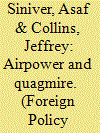

|
|
|
|
|
| Summary/Abstract |
This paper assesses the role that analogical reasoning played in Israel's decision making during the 2006 Second Lebanon War with Hezbollah. Two analogies seemed to dominate internal deliberations: the “air power superiority” analogy which drew on more than a decade of developments in military theory and the air-based campaigns of the two Gulf wars and the Balkan wars of the mid-1990s and late 1990s; and the “Lebanese quagmire” analogy which drew on Israel's own traumatic experience of Israel following the its first war in Lebanon in 1982. The misuse of these analogies by the Israeli political–military leadership during the war produced a myopic approach which advocated an almost total reliance on air power rather than ground maneuver to win the war and refrained from using ground forces for fear of entering another bloody and unpopular war in Lebanon. The constraining power of these analogies prevented the consideration of alternative courses of action or the effective calculation of cost-benefit analysis during the war. Whereas previous studies of the war provided various explanations to singular decisions or episodes, this paper shows that the air power and quagmire analogies contained the conceptual boundaries of Israeli decision making during the war and thus best explain its attraction and limitations.
|
|
|
|
|
|
|
|
|
|
|
|
|
|
|
|
| 2 |
ID:
137705
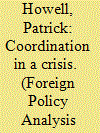

|
|
|
|
|
| Summary/Abstract |
This article explores possible theories of international economic policy coordination, and then proceeds to test these theories through a qualitative analysis of four EU member states – Germany, France, Belgium, and the Netherlands – and their preferences and experiences during the financial market crisis period of Fall/Winter 2008–2009. Both institutional and basic realist theories for coordination preferences are evaluated for explanatory power against the case of the 2008 financial crisis and are found lacking. Instead, this analysis finds that a comparative foreign policy theory of political constraints – institutional design, political polarization, and leader time horizons – emerges as the best fit for explaining the divergence in foreign policies among these EU member states.
|
|
|
|
|
|
|
|
|
|
|
|
|
|
|
|
| 3 |
ID:
137719
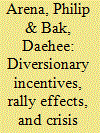

|
|
|
|
|
| Summary/Abstract |
We do not yet have strong evidence that the rally effect motivates domestically vulnerable leaders to become engaged in international conflict. We draw upon mechanism design to argue that, if anything, diversionary incentives should be associated with a greater likelihood of being the target of disputes, though the conditions under which the result obtains are restrictive. Our analysis of all dyad-months involving the United States and its rivals for the period from 1956–1996 yields suggestive evidence of the unconventional behavior anticipated by our model, while failing to find evidence of patterns anticipated by either traditional diversionary accounts or strategic conflict avoidance. These results suggest that if we are to better understand international conflict by focusing on diversionary incentives, which may not be very useful, we should focus on the behavior described by our formal model rather than that anticipated by either traditional diversionary accounts or strategic conflict avoidance.
|
|
|
|
|
|
|
|
|
|
|
|
|
|
|
|
| 4 |
ID:
137710
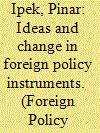

|
|
|
|
|
| Summary/Abstract |
Constructivism in the International Relations literature mainly focuses on the constitutive interaction between international norms and state actions. Few studies explore when ideas at the domestic level matter in foreign policy change. I propose a constructivist account for policy change that emphasizes not only ideas but also material interests as exogenous factors constituted within domestic structures. My empirical analysis in the case of the Turkish International Cooperation and Development Agency reveals important evidence demonstrating the influence of (i) shared normative values, mostly constituted by the foreign policy elite's intersubjective understanding of Turkey's historical roots and cultural ties in the region and (ii) material interests, favored through the “trading state” and framed by the convergence of principled and causal beliefs on policy change. Ideas matter in foreign policymaking when a set of contingent conditions is satisfied: (i) A small group of recognized foreign policy elite has shared normative beliefs and (ii) an enabling political environment exists, particularly a majority government facilitating foreign policy appointments to key positions so that a window of opportunity is provided for policy entrepreneurship.
|
|
|
|
|
|
|
|
|
|
|
|
|
|
|
|
| 5 |
ID:
137712
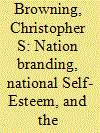

|
|
|
|
|
| Summary/Abstract |
Surprisingly, the emergent and increasingly popular phenomenon of nation branding has received only scant attention from International Relations scholars. While most analyses account for the phenomenon by emphasizing the perceived material benefits to be derived from establishing a positive national brand, this article provides an alternative perspective. It argues that nation-branding processes need to be understood as responding to the need of states and state leaders to enhance both their citizens and the nation's sense of ontological security and (self)-esteem. Moreover, this quest for self-esteem and ontological security is unfolding in the context of broader realignments occasioned by the advent of late modernity. While nation branding represents an understandable response to these developments, the article questions the strategy's overall efficacy by highlighting its implications for how national subjectivity is constituted, its notable disciplining elements and its potentially undemocratic implications.
|
|
|
|
|
|
|
|
|
|
|
|
|
|
|
|
| 6 |
ID:
137707


|
|
|
|
|
| Summary/Abstract |
Trade volatility can do serious harm to a country's economic and political stability. Research suggests that international trade agreements can reduce such volatility by reinforcing extant trade commitments, improving transparency, promoting policy convergence, and strengthening investor confidence. Drawing on this logic, we posit that international political ties can also produce notable reductions in export volatility. Specifically, we argue that diplomatic missions and military alliances signal lower discount rates, increase political transparency, and enhance issue linkages among trading partners. These enhancements in turn work to stabilize trade flows. To test this argument, we use a gravity model to evaluate the effects of directed diplomatic relations and alliances on bilateral export volatility. Controlling for confounding variables and exploring a wide array of model specifications, we find that the establishment of diplomatic relations or alliances can significantly reduce trade volatility.
|
|
|
|
|
|
|
|
|
|
|
|
|
|
|
|
|
|
|
|
|